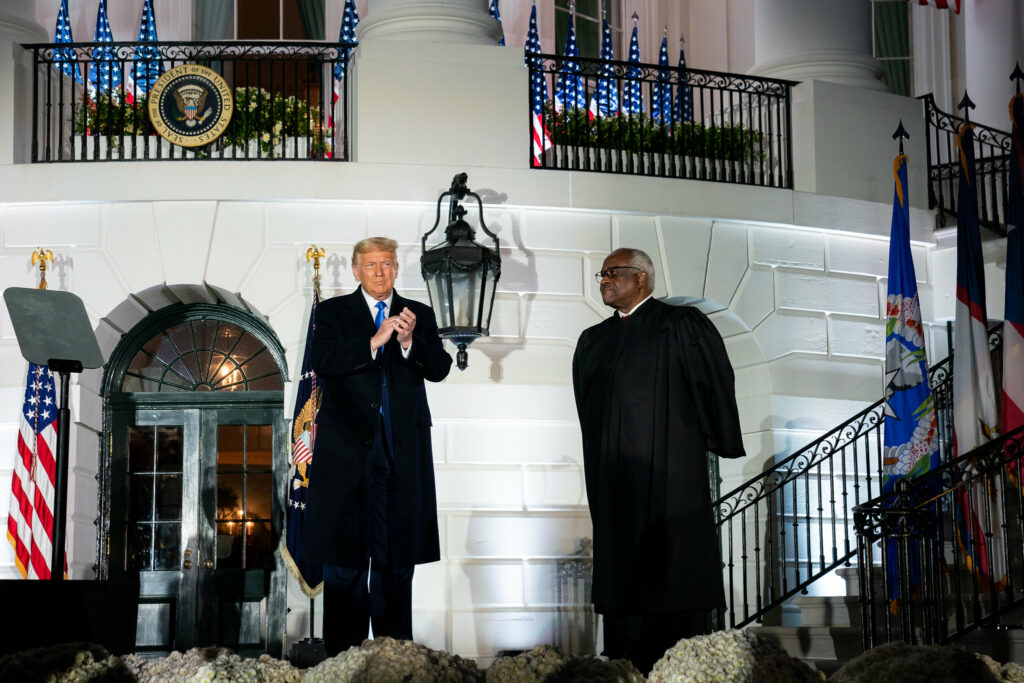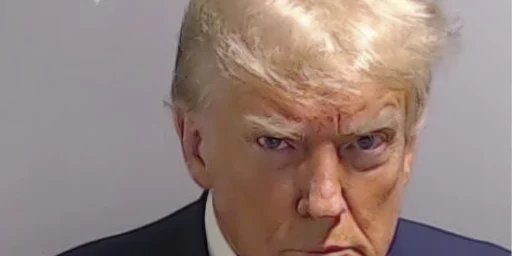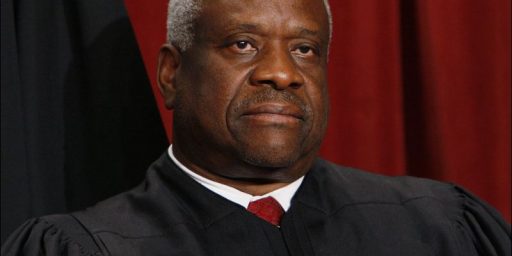On Respect and SCOTUS
The Court is out of balance--and it is a design flaw.

Via the AP: Justice Thomas slams cancel culture, ‘packing’ Supreme Court.
U.S. Supreme Court Justice Clarence Thomas said he’s concerned efforts to politicize the court or add additional justices may erode the institution’s credibility, speaking Friday in Utah at an event hosted by former Republican U.S. Sen. Orrin Hatch’s foundation.
[…]
“You can cavalierly talk about packing or stacking the court. You can cavalierly talk about doing this or doing that. At some point the institution is going to be compromised,” he told an audience of about 500 people at an upscale hotel in Salt Lake City.
“By doing this, you continue to chip away at the respect of the institutions that the next generation is going to need if they’re going to have civil society,” Thomas said.
I cannot find a full transcript of the speech, so do not know if Thomas used the word “politicize” or if that is the reporter’s word choice, so I will focus here on “respect” and the notion that “at some point the institution is going to be compromised.”
While I wholly agree that there is a legitimate debate to be had about expanding the Supreme Court (indeed, our own James Joyner is opposed for reasons not unlike Thomas’) I want to push back on the notion that talk of expansion is cavalier as well as the notion that the status quo as it pertains to the Court isn’t already actively eroding respect for the institution.
I would note there are plenty of people, myself included, who are hardly “cavalier” in our reasoning about expanding SCOTUS. There is nothing, ultimately, that is sacrosanct about the number nine (it is neither constitutionally mandated nor has it even always been the number of Justices). Having said that, I fully understand the political obstacles to expansion and the fact that, yes, it would highlight the extremely political role the Court plays (and I say that deliberately because any assertion that the Court is not “political” is just so much hogwash, but expansion would certainly put a spotlight on the politics of it all).
Beyond that, “respect” for the Court is already in a state of damage. The way the Scalia and RBG seats were filled clearly underscored the power politics of the Court, plain and simple. A major mistake that is made in the assessments of how “political” the Court is or isn’t is that people pretend like how the Court is constituted (which is inherently political) doesn’t affect how the Court then decides. Indeed, the notion that the ways individual members of the Court think about the Constitution, law, and governing is anything other than politics is folly.
Again: “politics” has to do with power over governing. It is about having power to set and enforce rules over society. To be in a position to make decisions about how society will do X, Y, or Z is politics.
As the AP piece notes:
Rulings this year will set laws on hot-button political issues, including abortion, guns and voting rights.
Those rulings will end up being a direct result of the politics of the Justices in question (their legal doctrines are almost certainly the result of their political POV). And the politics of those Justices were the reason they were picked by a given President (a political actor) who nominated them and, in turn, why they were confirmed (or, sometimes, not) by the Senate (a bunch of political actors).
As we are reminded of the confirmation process it is here that we find the real place where “respect” for the Court is eroding. In theory, there should be some level of political equilibrium in the Supreme Court. By this I mean that since the President nominates, each nominee ought to be selected by a politician who represents a majority of the population. Further, while the Senate majority that confirms each nominee may not be a true reflection of the majority of the country, it ought to be within shouting distance. As a result, the Court ought to be at least semi-representative of the country.
To be clear: I am not arguing that the Court ought to be a perfectly representative institution, but I am arguing that there ought to be some level of reasonable connectivity between popular political preferences and the composition of the Court. If this were not to be the case, we could select Justices in some non-political process (say as part of the civil service). The very fact that the Court is appointed by one politician and then confirmed by another set underscores that there is supposed to be some level of connection between the people and the bench even if it is a filtered one.*
There are some major problems with this equilibrium. We have increasingly seen the President be elected by a minority of the country (2000, 2016). This has, as I have noted before, created a situation in which most of the Republican nominees on the Court are directly linkable to a popular vote inversion in the Electoral College (five in total, which is a majority of the Court). While it is true that Bush’s two nominees (Roberts and Alito) were in his second term, the odds that he would have won the presidency in 2004 are radically diminished if he had lost in 2000. If Al Gore had become president in 2001 (as the winner of the popular vote), there is a more than decent chance that he would have filled those two seats during his second term.** The more egregious example is Donald Trump, who clearly*** lost the popular vote by almost 3 million. And yet, Trump appointed three members of the Court (Gorsuch, Kavanaugh, and Coney Barrett).****
I know readers of this site know all of this, but I think it is worth pausing to note: the majority of the Supreme Court is directly linked to the presidents who initially came to office without national majority support.
This is a political imbalance even for a system that is skewed away from pure representation.
Even if we set aside the popular vote issue, there is something out of balance for one president to be able to fill one-third of the Court in a single term. That, by itself, screams design flaw. Add in the perverse effects of the EC and the poor representational quality of the Senate and you get erosion of respect for the institution.
In regards to the Senate, its poor representation exacerbates the equilibrium question. When created, the idea that the Senate would be at least reasonably representative of the population given the mix and population sizes of the states***** meant, again, some level of reasonable equilibrium in the confirmation process (not to mention that the Framers did not conceive of the nomination process as being a partisan one, since they didn’t anticipate political parties).
These days the Senate over-represents Republicans, plain and simple. As I have noted before, the last time the Republicans in the Senate represented a majority of the population was 1996. This means, to pick the most egregious example when Justice Scalia died and the Republican-controlled Senate refused to even consider Obama’s nominee, it was a set of Senators representing a minority of citizens blocking a president who had majority support so that they could turn around and let a president with minority support fill the seat (to then be confirmed by a Senate representing a minority of the population).
Regardless of one’s theory of how the Senate should function, or whether one thinks this misrepresentation is justifiable, one cannot deny that it helps the Republicans influence who sits on the Court in a way that further erodes the degree to which the Court is even vaguely representative of national sentiment, especially as the EC’s flaws are amplified in the current era.
Throw into the mix the arbitrary way that vacancies occur, and the balance is even further thrown off.
It is this imbalance in our institutions that empowers minority preferences over the majority that is causing the erosion of respect that Justice Thomas says he fears. And I suspect this diminution of respect will grow when the current Court issues a series of rulings that runs counter to majority preferences on a host of controversial issues.
*I suppose we could say that since the EC selects the president and the Senate just represents states regardless of population size we really don’t have a representative government, and therefore this talk of equilibrium is misplaced. I am willing to entertain that line of thought, but fully adopting it means that we would have to admit that we really do not have a representative democracy at all in the United States.
I think that the real answer here is for us, as a country, to ask what kind of government we want and to acknowledge that either we have it, and it, therefore, isn’t “The greatest democracy in the world” and own that or to realize that it doesn’t really work the way a lot of people think it does.
**I will note, I voted for George W. Bush in 2000 and at the time was pleased with the result of Bush v. Gore. I will note that I actually, naively it turns out, thought that the popular vote inversion would lead to EC reform (which I supported at the time). In retrospect, SCOTUS got it wrong in my view in Bush v. Gore but I would note that the fact that a SCOTUS case essentially decided the 2000 election should slay, once and for all, the notion that the Court isn’t “political.” Even if one thinks each member of the Court was acting wholly as philosopher-judges (a dubious assumption on any case) the results were decidedly political in nature and effect.
***At least 2000 was almost a tie–Gore won 543,895 more votes than did Bush (0.52%).
****Really, the test of all of this is to be found here. No Republican would be happy with a Democrat in the White House who lost the popular vote then being allowed to appoint a full third of the Court. Indeed, no Republican would like the idea of a Democrat winning the White House but having lost the popular vote by ~3 million. No Republican would have thought it just if RGB died when Bush was in office and a Democratically-controlled Senate held over the replacement until Obama was in office.
We all inherently know all of this is jacked-up if we allow ourselves to step out of the current moment.
*****Yes, there were “small” states and “large” states, but the ratios were closer than they are now–and the way we added states to the country as we expanded clearly changed the dynamic of representation in the chamber beyond its original design.





We cannot possibly “politicize” the Court more than has already been done by Republicans. Start with Bush v. Gore and go downhill from there. They gutted the VRA, which was passed by overwhelming majorities. (I never want to here a conservative mutter about “activist judges” again). They did the Merrick Garland thing. They are walking away from doing anything about gerrymandering. We now have, sitting on the court, people who participated in the legal defense of Bush’s case in Bush v. Gore and people who participated in the idiot Whitewater investigation.
Could this get more partisan? It’s hard to see how.
Politicize is not a useful term. In this context, it’s like arguing with an automated voice on a phone. People in politics who profess to worry about politicization are either cannon-fodder or are not arguing in good faith. Or, in Thomas’ case, both. For him, the schtick has become his entire personality.
I would especially note that as this egregious scenario played out, Justice Thomas was profoundly silent about “chip[ping] away at the respect of the institutions that the next generation is going to need if they’re going to have civil society.”
So I will be decidedly disrespectful and uncivil and say Clarence can STFU.
Thomas is a clueless joke. His wife is politically active amongst the looniest of the establishment Republican patrons (which is saying something) and receives money in exchange for lobbying on issues that her husband rules on in his role as Supreme Court justice.
And add to everything Steven has said here that during times of Republican control, no federal or state judge can rise through the ranks unless they are members of the Federalist Society and attend their billionaire funded “seminars” where they are taught the proper way to rule. All six of the Republican members of the Supremes are members, all six have attended these so-called seminars at luxury resorts, paid for by secretive billionaires with tremendously valuable interests before courts at every level. During Clarence’s time it was a unwritten requirement that a Republican justice have the Federalist Society endorsement. For the last two Republican administrations that has metastasized to the point where the Federalist Society actually provides the short list. Bush II or Trump simply picked from the slate proffered.
@Modulo Myself:
Drone strikes to create vacancies. Less dramatically, politically motivated prosecutions to create vacancies.
There’s always a way to make things worse, and it really isn’t that hard to see how.
Clarence Thomas and the horse he rode in on. Why is it that our “betters” concern about respect for themselves and their institutions never seems to extend to behaving respectably? If Thomas wants to depoliticized the Court he can start recusing himself from cases in which his RWNJ wife has an interest.
@gVOR08:
Please don’t take this as a criticism of you, but I hate that expression”our betters,” even when used the way you did. It’s a favorite of the Trumpkins, used with profound scorn, to describe anyone in government, journalism, or the arts who isn’t Marjorie Taylor Greene, Lauren Boebert, Madison Cawthorn, or Trump himself.
Has there ever been a single country in history where one branch of government is not political?
@CSK: My intent, as expressed by the quote marks, was to express scorn for our self styled “elites”, so we’re in basic agreement and certainly no offense taken.
@Jay L Gischer:
At some point the states are going to just start ignoring federal court rulings.
@MarkedMan:
It occurred to me while writing this, but I did not want yet another digression so I did not follow-up on the thought, that the Federalist Society is basically a political party for judges (at least in terms of a nominating function).
@gVOR08:
Indeed.
I can hardly wait for the day when the Supremes have to consider a case in which their alternatives are: a) vote against a cherished position of the Federalist Society or b) concede that the judicial branch is not a coequal branch of government. It will come, sooner or later.
Clarence Thomas, his uncivil insurrectionist wife, and the other radical right activist hacks on the court have done more to destroy its credibility than anyone not named Mitch McConnell.
Some of their greatest hits: stopping the Florida recount in Bush v Gore, twisting the 2nd Amendment to invent an imdivual right for any nutjob to own any firearm they want, inventing corporate personhood to allow dark money to flood our election, rewriting regulations from the bench, gutting the Voting Rights Act to enable mass vote suppression, enabling forced birth and on and on.
The John Roberts Apartheid Court has decided to put itself against the will of the American people and the consent of the goverment. Thomas thinks the court is “going to be compromised?” Lol what alt right planet is Clarence Thomas living on that he hasn’t noticed that ship sailed two decades ago?
@Gustopher:
“Less dramatically, politically motivated prosecutions to create vacancies.”
If threats to do so count, we’ve already been there, done that .
@Steven L. Taylor: The Federalist Society does sort of function as a political party for purposes of nominating judges. I believe their membership is limited to lawyers and law students, excluding the rest of the electorate. And I’m unaware that the membership has much voice in selecting nominees. Is there any transparency on the process? I can’t help but think the donors and their representatives have a significant voice. And I suspect they’re why the Republicans feel bound to stick to the FS nominee list, in addition to funding the luxury seminars mentioned above. The word that comes to my mind isn’t “party” so much as “cabal”.
Mitch McConnell has frequently proclaimed that stacking the federal courts with Republican judges was the greatest achievement of the Trump presidency. He doesn’t use those words, but that’s clearly what he means. Ditto Trump and Lindsey Graham, but they went much further in 2020. They predicted the Supreme Court would decide the election, making it vital Trump’s replacement for RBG be confirmed in time to decide the outcome in his favor. Again, they didn’t put it quite that crudely, but everyone understood that’s what they meant.
In an era when journalists writing about federal court cases routinely identify judges as appointees of a particular president, because it’s widely regarded as a key variable in how they reach their decisions, talk about preventing the politicisation of the courts is a quaint anachronism.
@gVOR08:
https://www.citizensforethics.org/reports-investigations/crew-investigations/80-million-dark-money-group-tied-to-trump-supreme-court-advisor-leonard-leo/
@Ken_L:
I’d go a step further and say that it is an ahistorical fantasy. The Court has always been “political.”
@Kathy: Has there ever been a single country in history where one branch of government is not political?
Probably not, but Democrats are determined to politicize ALL US government. Consider: Democrats get in and add judges. Then Republicans get in and want more. Ad infinitum. Impartiality and the nation’s interest go out the window. Oh, wait. I forgot; if Democrats pack the court they won’t allow a 2-party system anymore.